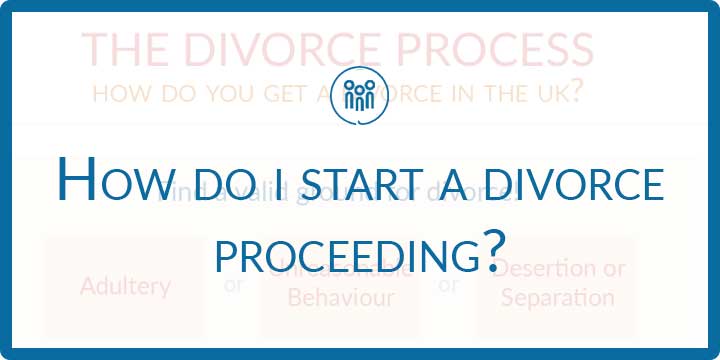When the decision to end a marriage is made, then besides the emotional and psychological trauma that goes with the exit, dealing with the legalities of a divorce can seem about as scary as climbing a mountain. However, with the right legal team supporting you, it needn’t seem such an unattainable feat.
There are lots of things that you need to consider before embarking on the process including issues concerning your finances and children all of which will affect the running of your case. In a nutshell however, the main things to consider when going for a divorce are summarised below.
The Divorce Process
The following steps outline the normal course that a divorce will follow.
1. Sending The Divorce Petition
If you or your spouse are normally resident in England or Wales and have been married for over a year, either one of you can apply for a divorce. All divorces start by sending a Divorce Petition which is sent to Court with the marriage certificate. The Divorce Petition outlines that the marriage has broken down irretrievably because one of the following things has happened:
- adultery
- your partner has behaved unreasonably
- your partner has left you without your agreement (‘deserted’) for more than two years
- you’ve lived apart for at least two years, if you both agree to the divorce
- you’ve lived apart for at least five years, even if one you don’t agree to the divorce
Unreasonable behaviour is the most common reason given for a divorce. It can include physical, emotional, financial or social problems within the marriage, or any behaviour that you find it unreasonable to live with. The Divorce Petition is also sent along with the Statement of Arrangements for the Children if this is needed.
2. The Respondent Acknowledges the Divorce Petition
After the court has received the divorce petition, it will confirm receipt of the petition and send it to the other spouse (the ‘respondent’) or a lawyer acting on their behalf. They have to reply within 8 days and tell the court if they agree to the divorce, if there is agreement regarding arrangements for the children and if there are any disputed costs.
3. Defended or Undefended?
At this point, the divorce proceedings can happen in two different ways, depending on whether the respondent agrees (an undefended divorce) or doesn’t agree to ending the marriage (a defended divorce.)
a. If the respondent intends to defend the divorce, they will have to send a defence to Court, however a divorce contested through hearings is quite unusual. Most parties reach agreement during the proceedings or through mediation. If the issue goes to Court, then a judge will decide whether to grant a decree nisi.
b. If the divorce is not defended – that is, both parties agree to end the marriage – then the petitioner can apply for the decree nisi.
4. The Decree Nisi
A Judge will review the application for the decree nisi, which is a document that says that the Court agrees that there are grounds for divorce. However, this is does not mean that the divorce is finalised. After the decree nisi is given, the court can make decisions about the marital home and other financial property.
5. The Decree Absolute
6 weeks and 1 day after the decree nisi has been granted, the petitioner can apply for the final decree which is the decree absolute. This decree is what makes the divorce final. After the decree absolute has been sent to the petitioner and respondent the marriage is ended.
Children
Issues concerning arrangements for children from where they live to who they will see will usually be the first thing to consider. It’s very important for both parties put their needs and welfare first and decide either through a voluntary agreement or with help through solicitor led negotiation or intervention from mediation, what the arrangements are for the children.
These arrangements will affect how the finances are handled and dealt with by the courts. If the parties cannot agree, then they will have to consider applying to the court for the orders to assist with settling arrangements for the children. In this case, the divorce and any financial matters will be affected until such matters are resolved.
Finances
Whilst it may seem obvious that financial matters are dealt with at the same time as the divorce, this is not always the case. Both matters are dealt with separately insofar as the processes are concerned although they ‘marry up’ towards the end. Financial matters and how to divide the matrimonial wealth can be very complicated and it is vital that you have an experienced solicitor to guide you through this process helping you to make the right choices.
Settling finances can take a few months to a few years and usually the divorce is placed on hold pending an agreement. If the parties are unable to agree, then as with issues concerning children, they can enlist the help of their solicitor with voluntary negotiations or help from mediation and failing both, can make an application to the court. The latter will trigger a process allocated to an intense timetable which is a very stressful even for the best of litigants.
Mediation
A lot of divorce cases are settled out of court with the help of solicitors or independent mediation. This is an informal process scheduled around the parties needs and availability, is less intrusive than court proceedings as well as being much more cost-effective than going to court. However, there are no deadlines which can lead to delays and any agreement reached is not binding unless then embodied into a court order which a solicitor has to draft and file at court.
Nonetheless, mediation is a flexible process which has become increasingly popular especially amongst co-operating couples and more so as it still a pre-requisite to any court applications.Before you embark on this process, make sure to understand your rights and obligations so that you can make the right choices for and your family.



